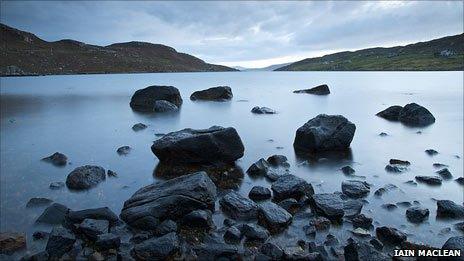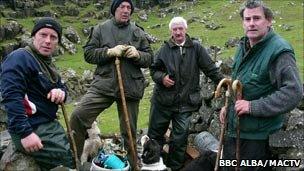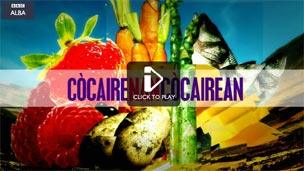Celebrated island life challenged
- Published

The Western Isles are among island groups that will be promoted during 2011
The Year of Scotland's Islands celebrations will start in April this year with events promoting the culture and creativity of island communities.
Backed by European and Lottery funding, the year's organisers have invited groups to apply for money to support their projects.
For one island chain the celebrations will come at a time when its people and culture are enjoying high-profile exposure, but also huge challenges to many of its residents' ways of life.
The Western Isles, which includes the islands of Lewis, Harris and the Uists, has a population, external of about 26,180. The population has been in decline since 1999.
Among the greatest challenges to the islanders are changes to their transport links to the Scottish mainland and fuel costs.
Some of the highest prices for petrol, diesel and domestic heating oil in Scotland are paid on the Outer Hebrides.
The islands' SNP MSP Alasdair Allan said the average price for heating oil for the isles had increased by 40-50%.
He has welcomed an Office of Fair Trading market study, external into the supply of energy to consumers who are not connected to the main gas grid.
Mr Allan told BBC Radio Scotland: "I hope it will look at the wider issues of to what extent do we recognise there is a particular problem for a group of people who perhaps switched from coal or peat 10 years ago to oil at a time when oil was a fraction of the price it is now.
"In many cases these are elderly people who are left with a really impossible situation and impossible task of heating their house."
'Traditional values'
Earlier this month, local authority worker Marian MacLeod, from Harris, told how the cost of making her 50-mile a day trip to and from work had increased.
She said she has seen the price she pays for petrol rise by £20 a week over the last 12 months, making her monthly outgoings on fuel £80 more expensive than a year ago.

A handful of crofters continue the tradition of tending flocks on remote islands
The lifeline ferry service to Harris is also under review.
Operator Caledonian MacBrayne has proposed sailings to and from the isle on Sundays for the first time.
The Reverend Iain Campbell, chairman of the local Lord's Day Observance Society branch, said it would mark a "further erosion of traditional values".
The minister of Point Free Church said the branch wanted to defend the Sabbath from the intrusion of "the hustle and bustle 24/7 travel".
Another islander who previously fought earlier plans to introduce Sunday ferry sailings for Harris has said he would not stand in the way of the new plan to do so.
John Murdo Morrison told Caledonian MacBrayne to "go and burn their timetables" during campaigns against the Sabbath sailings in 1989 and 1990s.
He has now said, that for economic reasons, it would benefit the island.
Sea shepherds
Religious traditions are not the only ones under threat.
Guga hunts, the harvesting of young gannets for their meat by residents of Ness, on Lewis, also has an uncertain future.
In August, 10 men from Ness travelled to the island of Sula Sgeir for a two-week hunt which is allowed under an exemption from laws prohibiting the practice elsewhere in the UK.
Last year, the Scottish SPCA wrote to the Scottish government asking for a ban on the Ness hunt, external.
Scottish Natural Heritage responded to the call, external and said it was done under licence and was not considered a threat to the seabirds' conservation status.
Another tradition clinging to survival is the tending of flocks of sheep on the Shiant Islands off the coast of Lewis and Pabbay off Harris.
Dubbed sea shepherds, the handful of crofters manage livestock on pastures of the tiny islands.

BBC Alba will be made available on Freeview later this year
One of the crofters, Sandy Granville, has said that without newcomers to the shepherds' ranks the grass would be grazed by "decorative flocks".
Meanwhile, other aspects of the Western Isles' culture, language and day-to-day life are experiencing UK-wide exposure.
Later this year, Gaelic language service BBC Alba is to be made available on Freeview in Scotland following a review by the BBC Trust.
Programmes are currently available on Sky, Freesat and live on the BBC iPlayer.
Scottish politicians and local authorities had called for the channel to be shown on Freeview.
The BBC Trust said in December last year that the service run by the BBC and MG Alba was performing well and meeting its aims.
Seventy-one entries were submitted to this year's FilmG Gaelic short film awards and the Celtic Media Festival in April is a featured event of the Year of Scotland's Islands.
And Manran - a Gaelic band whose members include Scotland shinty squad captain Gary Innes - has made a bid for a UK top 40 position.
Their song Latha Math reached number one in the UK singer/songwriter charts and number six in the Scottish music charts following its release earlier this month.
- Published28 January 2011
- Published19 January 2011
- Published13 January 2011
- Published7 January 2011
- Published18 January 2011
- Published21 December 2010